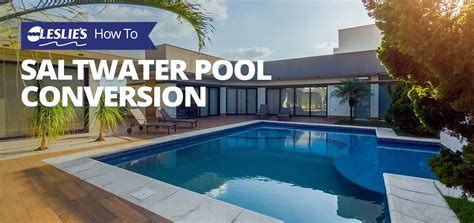Saltwater Pool Conversion: Simplify Your Pool Care
Switching from a traditional chlorine pool to a saltwater pool is a popular choice for homeowners seeking a simpler, gentler, and potentially more cost-effective way to maintain their swimming haven. But what exactly does a saltwater pool conversion entail, and is it the right choice for you? This comprehensive guide will explore everything you need to know about converting your existing pool to a saltwater system, addressing common questions and concerns along the way.
What is a Saltwater Pool?
Before diving into the conversion process, let's clarify what a saltwater pool actually is. It's not a pool filled with seawater; instead, it uses a chlorine generator to produce chlorine from salt (sodium chloride) dissolved in the pool water. This process significantly reduces the need for manually adding chlorine, simplifying pool maintenance and often resulting in softer, gentler water.
How Does a Saltwater Pool Conversion Work?
The conversion process involves installing a saltwater chlorine generator (SWG) into your existing pool's plumbing system. This device takes the salt already dissolved in your pool water and, through electrolysis, converts it into chlorine. This chlorine sanitizes the water, keeping it clean and safe for swimming. The process is continuous and automated, requiring minimal intervention from the pool owner.
What Equipment is Needed for a Saltwater Pool Conversion?
The core component is the saltwater chlorine generator (SWG). You'll also need a salt cell, the part of the SWG where the electrolysis takes place. The size and capacity of these components will depend on the size of your pool. A qualified pool professional can assess your pool and recommend the appropriate equipment. In some cases, you may also require modifications to your existing pool plumbing to accommodate the new equipment.
Is a Saltwater Pool Conversion Right for Me?
This is a crucial question to consider. While a saltwater pool offers many advantages, it's not always the perfect solution for everyone. Let's weigh the pros and cons:
Pros:
- Simplified Maintenance: Significantly reduces the need for manually adding chlorine.
- Softer Water: Saltwater pools often feel softer on the skin and hair.
- Potential Cost Savings: While the initial investment can be significant, reduced chemical costs over time can lead to savings.
- Environmentally Friendly: Reduces the use of harsh chemicals compared to traditional chlorine pools.
Cons:
- Initial Cost: The upfront cost of purchasing and installing the SWG can be substantial.
- Equipment Maintenance: The SWG requires regular maintenance, including cleaning or replacing the salt cell.
- Salt Cell Replacement: Salt cells have a limited lifespan and need replacing periodically, adding to the ongoing cost.
- Potential for Corrosion: Saltwater can be corrosive to some pool equipment; ensuring compatibility is essential.
What are the Different Types of Saltwater Chlorine Generators?
Saltwater chlorine generators vary in size, capacity, and features. Some key factors to consider include:
- Output Capacity: Choose a generator with sufficient output to match your pool's size and usage.
- Cell Type: Different cell types offer varying lifespans and maintenance requirements.
- Control Features: Look for features like automatic cleaning cycles and self-diagnostics.
How Much Does a Saltwater Pool Conversion Cost?
The cost of converting to a saltwater pool varies significantly depending on the size of your pool, the type of SWG chosen, and the labor costs associated with installation. It's best to obtain multiple quotes from reputable pool professionals to get an accurate estimate.
How Much Salt Do I Need for a Saltwater Pool?
The amount of salt required depends on the size of your pool and the concentration recommended by the SWG manufacturer. Typically, the salt concentration is maintained at around 3,000 parts per million (ppm), which is roughly equivalent to the salinity of ocean water.
How Often Do I Need to Clean or Replace the Salt Cell?
The frequency of cleaning and replacement depends on factors like pool usage, water quality, and the type of salt cell used. Regular cleaning is typically required, and salt cells usually need replacing every 3-5 years.
Can I Convert My Pool Myself?
While technically possible for those with plumbing expertise, it's highly recommended to hire a qualified pool professional for a saltwater pool conversion. Improper installation can lead to equipment malfunction, damage to your pool, and safety hazards.
Conclusion: Is a Saltwater Conversion Worth It?
A saltwater pool conversion offers a compelling alternative to traditional chlorine pools, promising simplified maintenance and potentially lower long-term costs. However, careful consideration of the upfront investment, ongoing maintenance requirements, and the suitability for your specific pool and needs is crucial. Consulting with a reputable pool professional will help you determine if a saltwater conversion is the right choice for your swimming paradise.

